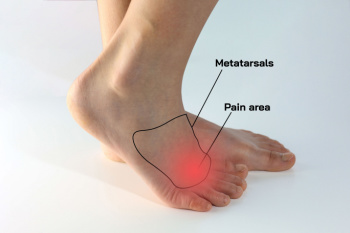
Plantar digital neuroma, also known as Morton's neuroma, is characterized by the thickening of the tissue surrounding the nerves that run between the toes, most often affecting the area between the third and fourth toes. This thickening can cause compression and irritation of the nerve, leading to pain and discomfort. Individuals with plantar digital neuroma typically experience sharp or burning pain in the ball of the foot, tingling or numbness in the toes, and the sensation of standing on a pebble or fold in a sock. Pain may worsen with walking, wearing tight or narrow shoes, or squeezing the forefoot. The discomfort associated with Morton’s neuroma can be disruptive to daily activities and may worsen over time if left untreated. Recognizing the symptoms of plantar digital neuroma is essential for seeking proper diagnosis and treatment to alleviate pain and restore foot health. If you have pain or discomfort between your third and fourth toes, it is suggested that you consult a podiatrist who can confirm Morton's neuroma, and offer correct treatment solutions.
Morton’s neuroma is a very uncomfortable condition to live with. If you think you have Morton’s neuroma, contact George Tellam, DPM of Ankle & Foot Associates. Our doctor will attend to all of your foot care needs and answer any of your related questions.
Morton’s Neuroma
Morton's neuroma is a painful foot condition that commonly affects the areas between the second and third or third and fourth toe, although other areas of the foot are also susceptible. Morton’s neuroma is caused by an inflamed nerve in the foot that is being squeezed and aggravated by surrounding bones.
What Increases the Chances of Having Morton’s Neuroma?
- Ill-fitting high heels or shoes that add pressure to the toe or foot
- Jogging, running or any sport that involves constant impact to the foot
- Flat feet, bunions, and any other foot deformities
Morton’s neuroma is a very treatable condition. Orthotics and shoe inserts can often be used to alleviate the pain on the forefront of the feet. In more severe cases, corticosteroids can also be prescribed. In order to figure out the best treatment for your neuroma, it’s recommended to seek the care of a podiatrist who can diagnose your condition and provide different treatment options.
If you have any questions, please feel free to contact our offices located in Orange Park and Jacksonville Beach, FL . We offer the newest diagnostic and treatment technologies for all your foot care needs.
